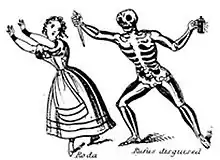Jane Scott | |
|---|---|
 Sketch of a scene from Jane Scott's 1816 melodrama, The Old Oak Chest | |
| Born | bap. 1779 |
| Died | 6 December 1839 Walton-on-Thames, Surrey |
| Resting place | St Mary with St John, Upper Edmonton |
| Occupation | theatre manager; performer; dramatist |
| Language | English |
| Years active | 1806—1819 |
| Notable work | The Old Oak Chest (1816) |
| Spouse | John Davies Middleton (1790–1867) |
| Relatives | John Scott (father; 1752–1838); Elizabeth Scott (mother; 1750–1829) |
Jane Marie Scott (1779–1839) was a British theatre manager, performer, and playwright.
Scott, a singing instructor, and her father, manufacturer John Scott, established the Sans Pareil Theatre (after 1819 renamed the Adelphi Theatre) in London. He built the theatre and she wrote the speeches, songs, and other entertainments which were performed at the opening on November 17, 1806.[1][2] Jane Scott offered solo entertainments of her own musical compositions. She and her father gathered a theatrical company and by 1809 the theatre was licensed for musical entertainments, pantomime, and burletta. Scott wrote more than fifty stage pieces in an array of genres: melodramas, pantomimes, farces, comic operettas, historical dramas, and adaptations, as well as translations. Given the ephemeral nature of much of this work, however, most of it has not survived: Jane Scott worked in what one critic has called "the illegitimate sphere beyond the reach of print culture."[3]
The Sans Pareil was significant in the move towards "free" theatre and away from the monopolies that dominated licensed theatre at the time. Jacky Bratton credits Scott's role in London theatre: "She had her finger on the pulse of a new world of entertainment for all, and her management of the theatre she created is important for its responsive and intelligent reading of the new audiences and the provision of exciting work for them to enjoy."[4]
Scott retired in 1819 and married John Davies Middleton (1790–1867). She lived in Surrey until her death, in 1839, aged 59 or 60, from breast cancer.
Partial bibliography
- Mary the Maid of the Inn (1809)
- Disappointments (1810)
- The Animated Effigy (1811)
- The Lowland Romp (1811)
- The Conjuror (translated from the French, 1815)
- The Dinner of Madelon (1816)
- Whackham and Windham (1814)
- The Row of Ballynavogue (adaptations from the fiction of Maria Edgeworth; 1817)
- The Fire Goblin (adaptations from the fiction of Walter Scott; 1819)
- The Forest Knight (1813)
- Fairy Legends (1818)
- The Fortunate Youth (1818)
- Asgard the Demon Hunter (1812)
- Camilla the Amazon (1817)
- The Old Oak Chest (1816)
References
- ↑ There is some disagreement about the date but Nov. 17 seems likely. See The Adelphi Theatre: The 1806–1807 Season
- ↑ "Jane M. Scott." Orlando: Women’s Writing in the British Isles from the Beginnings to the Present. Accessed 21 July, 2022. (Orlando)
- ↑ Bratton, Jacky, cited by Gilli Bush-Bailey, "Still Working it Out: an account of the practical workshop re-discovery of company practice and Romantic performance styles via Jane Scott's plays." Nineteenth-Century Theatre and Film Vol 29, Issue 2 (November 1, 2002) <https://doi.org/10.7227/NCTF.29.2.2>
- ↑ Bratton, Jacky. "Scott, Jane Margaret (bap. 1779, d. 1839)." Oxford Dictionary of National Biography. Ed. H. C. G. Matthew and Brian Harrison. Oxford: OUP, 2004. 30 November 2006.
Resources
- The Adelphi Theatre: The 1806–1807 Season
- Bratton, Jacky. "Scott, Jane Margaret (bap. 1779, d. 1839)." Oxford Dictionary of National Biography. Ed. H. C. G. Matthew and Brian Harrison. Oxford: OUP, 2004. 30 November 2006.
- Burroughs, Catherine, Ed. Women in British Romantic Theatre: Drama, Performance, and Society, 1790-1840. Cambridge UP, 2000.
- Crochunis, Thomas & Michael Eberle-Sinatra (2003) "Putting plays (and more) in cyberspace : an overview of the British women playwrights around 1800 project." European Romantic Review, 14:1 (2003): 117-131, DOI: 10.1080/10509580303680
- Scott, Jane. "The Old Oak Chest" (1816). In Sisters of Gore: Seven Gothic Melodramas by British Women, 1790-1843. Edited by John C. Franceschina (1997; rpt. Routledge, 2014.)